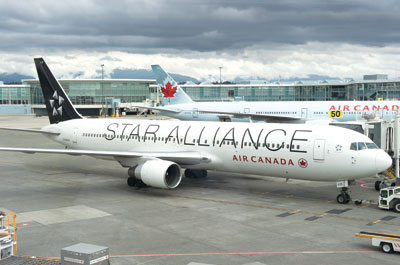
Features
Operations
Alternate Approach: Into the theatre of the absurd
It should never have come to this.
February 24, 2011 By David Carr
It should never have come to this. Canada’s spat with the United Arab Emirates (UAE) over expanded landing rights for Dubai-based Emirates and Abu Dhabi’s Etihad Airways has spiralled out of control, and is likely to result in another embarrassing climb-down by Ottawa, similar to when the federal government ordered the removal of tinned corned beef from store shelves during a scrap with Brazil over a trade dispute between Bombardier and rival Embraer.

|
|
For the record, Hereford Premium Corned Beef sandwiched between two slices of white bread with pickled onion and a dab of HP Sauce is quite the treat. That the average Canadian household could be denied a grocery staple because of a quarrel between aircraft manufacturers over dodgy government subsidies never sat well in this corner.
With the UAE dispute the retaliatory stakes are growing broader. Yes, the kingdom overplayed its hand when it linked commercial landing rights with continued access to an airbase that Canadian Forces used as a staging area for the war in Afghanistan. But how seriously are we supposed to take that when Defence Minister Peter MacKay upstaged his own government by sporting a Fly Emirates baseball cap?
As often happens whenever aviation is concerned, we have entered the theatre of the absurd surrounded by walls of entry visas and Canadian businessmen being turned away at the Dubai customs hall. Duncan Dee, Air Canada’s chief operating officer, launched an over-the-top attack on the former Liberal government after foreign affairs critic Bob Rae came out in support of Emirates. Dee, a Liberal staffer before being hired by Robert Milton during the Chretien years largely for his bulging Rolodex, held his previous employer responsible for every airline bankruptcy in Canada prior to 2006.
More recently, Canadian authorities drew strength from a German decision to block future Emirates flights to both Stuttgart and the new Berlin airport scheduled to open next year. The spin was predictable: see, it’s not just us. But dial back 40 years, when an Air Canada 747 bound for Frankfurt idled on the tarmac in Montreal after German authorities withdrew permission to land because Transport Canada stubbornly refused Lufthansa Toronto landing rights after more than 10 years of negotiations.
The core interest in this dust-up is transfer traffic. Emirates, Etihad and Qatar Airways are using capacity and spacious, modern airports in the Gulf to draw traffic and become super-connectors. It appears to be working. Dubai has already jumped into the position of world’s third busiest international airport after London-Heathrow and Hong Kong. Likewise, Air Canada’s global reach is extended through closer tie-ups with larger Star Alliance partners such as Lufthansa.
It is a clash of business models not unlike the Airbus A380 versus serial delayed Boeing 787. The problem for Air Canada is that Emirates is flying to spots more Canadians want to go while side-stepping creaking and overcrowded international hubs such as London Heathrow.
Air Canada gets it. As with Boeing and the launch of a larger 747-8I passenger aircraft, the airline sought to hedge its bets by proposing an alliance with Emirates where the UAE carrier would do the heavy lifting with daily flights to Toronto in exchange for 50 per cent of the profit. Such an arrangement belies both Air Canada and Transport Canada’s argument that the route is already well served.
How this plays out in Calgary and Vancouver – destinations Emirates would like to add to its route map – is the question. In the 1980s, Alberta forced the Mulroney government’s hand by electing its first Senator. Unilaterally allowing Emirates to fly to Calgary would be a symbolic, albeit largely hollow, gesture, but one that would be consistent with open skies and today’s reality that Canadian airports are independent businesses capable of negotiating their own commercial agreements.
Historically, disputes over landing rights are not uncommon in Canada, but rarely have they been so vitriolic. Both Air Canada and Emirates have buttressed their arguments by tossing out predictions of gains and losses. These are largely red herrings. The issue is competition versus protectionism, and Air Canada is a quality airline that should be able to compete. Still, whatever happens next, Canadian consumers can take comfort that the UAE, unlike Brazil, is not a major food exporter and our grocery carts can be spared.
David Carr is a Wings writer and columnist.